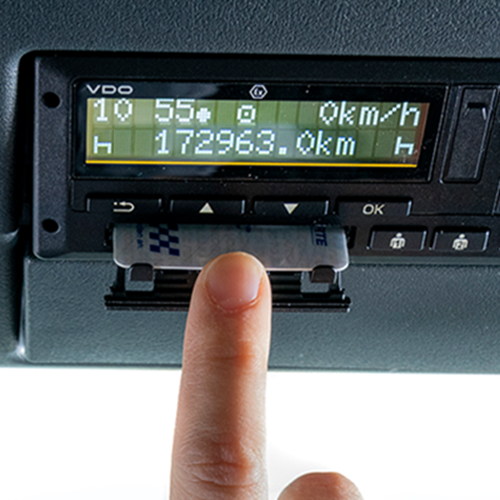The innovative and extremely reliable data acquisition of the DTCO 4.0 makes the latest tachograph from VDO an important component of the new logistics architecture which Europe has agreed upon. In order to make transport within the continent more efficient and fairer, the EU Parliament adopted the so-called Mobility Package 1 after more than two and a half years of tough negotiations. In addition to maritime, rail and air transport, the measures primarily concern road transport.
The rights of drivers in particular are to be strengthened. In order to effectively enforce the new regulations, the location and driving time data collected by the intelligent tachograph are indispensable
Fair competition and social standards
The EU focuses on the following aspects of HGV transport:
1. Driving times and rest periods
The previous regulations will largely remain in place, but the quality of weekly rest periods for drivers will be improved – for example, the transport company will have to pay for appropriate accommodation. This means that the regular weekly rest period in the driver’s cab will be prohibited in the future. International drivers will be allowed to reduce their weekly rest period to 24 hours twice in succession (instead of just once to date). In this case, however, a regular rest period of 4-5 days must be adhered to in the third week. Companies will even have to pay their drivers to enable them to return to their home countries.
2. Cabotage
The commercial transport of goods by foreign companies which have neither a registered office nor an establishment in the host countries concerned (cabotage) will be regulated more simply, limited in time and better controlled. As before, a maximum of three cabotage operations per week are permitted in an EU member state. After that, however, the vehicle is banned for four days in the country the cabotage operations took place in.
3. Posting of drivers
Truck drivers posted to other EU countries to provide transport services will be better protected from exploitation. This will apply to general workers’ rights and to the minimum wage in particular. In this case, the wage and social standards of the country to which drivers are posted will always apply – the same pay for the same work at the same location. Repeated infringements of cabotage and posting rules in the future may lead to the loss of the transport company’s EU Community licence.
4. Market access
The criteria for access to the EU market will be adapted in such a way that it will no longer be possible for “letterbox companies” to register vehicles in a country with low taxes and low wages, but to have them mainly driven in countries with lucrative remuneration. To this end, companies must have sufficient staff, premises and vehicles in proportion to the size of their fleets, as well as a registered company office. Vehicles operating abroad must return to the country of the branch office within eight weeks at the latest. This also applies to vans and sprinters.
The smart tachograph as the main instrument of the EU
The EU is fully committed to the smart tachograph as a means of enforcing the new rules. The device will provide the authorities with location data and driving times, ensuring that no HGV is driven too long, no prescribed rest periods are violated and no rules regarding transfer to the home country are disregarded.
On the technical side, satellite positioning will be expanded: in addition to the existing GPS and the Russian GLONASS, the new European system Galileo will be established. Continental is already developing the DTCO® 4.1, which will be equipped with the relevant cutting-edge technology.
Tachograph obligation is extended
According to the new regulation, vans in international traffic weighing 2.5 tonnes or more must also be equipped with a tachograph by 2026. This is good news for DTCO® workshops, because it means no shortage of orders in the future! With the establishment of the intelligent tachograph as an important control instrument in EU road transport, Continental’s small driving companion will become indispensable. However, the devices must be installed and tested as usual.
EU also proposes on-board weighing systems for HGVs
To combat the various permissible gross weights of HGVs being exceeded, the EU adopted regulation 2019/1213, calling on its member countries to establish uniform test procedures by May 27, 2021. Two options have been specified in this regulation. The first provides for automatic recording systems to be integrated into the road infrastructure, while the second method of controlling the gross weight is to use on-board weighing systems. These will automatically measure the vehicle’s weight and axle load, as well as the weight of the semi-trailer or trailer. The results will then be transmitted to the recording equipment via a secure signal. If a country decides in favour of this second option, its control authorities must be able to access the weight data via DSRC (Dedicated Short Range Communication) when the HGV passes the roadside recording sensors. This will come into force from 2024 onwards.
German experts are critical of the technology
The German Federal Association of Road Haulage, Logistics and Disposal (BGL) and the Federal Ministry of Transport and Digital Infrastructure (BMVI) are criticising the system, pointing out that the measurement results would differ depending on whether the vehicle was at a standstill, driving at speed or on a gradient – so at this point in time, it seems unlikely that Germany will introduce the compulsory on-board weighing systems. The mandatory single or three-load testing would also cause vehicle downtime problems, since the HGVs would have to remain in the workshops until the tests were completed.







